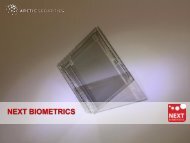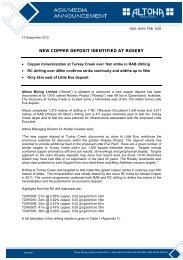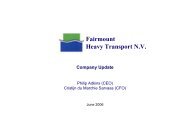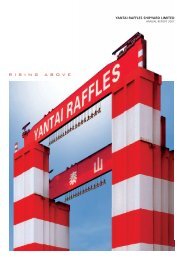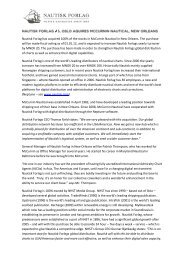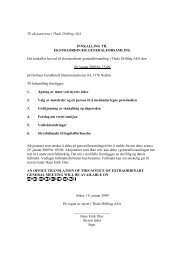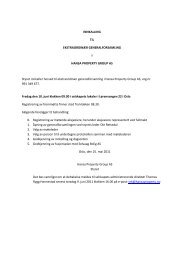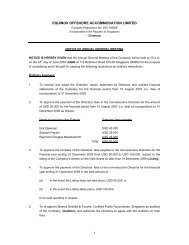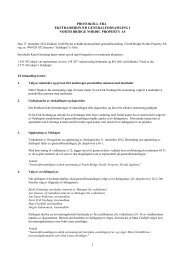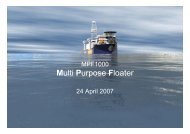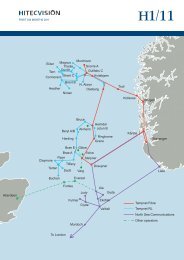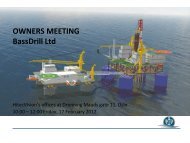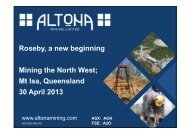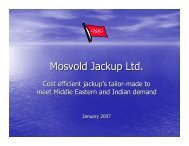You also want an ePaper? Increase the reach of your titles
YUMPU automatically turns print PDFs into web optimized ePapers that Google loves.
Notes – Marine Subsea Consolidated<br />
amount of goodwill recognised, the reported results in the period that<br />
an acquisition occurs, and future reported results. lAS 27R requires<br />
that a change in the ownership interest of a subsidiary (without loss<br />
of control) is accounted for as an equity transaction. Therefore, such<br />
transactions will no longer give rise to goodwill, nor will it give rise<br />
to a gain or loss. Furthermore, the amended standard changes the<br />
accounting for losses incurred by the subsidiary as well as the loss of<br />
control of a subsidiary. Other consequential amendments were made<br />
to lAS 7 statement of Cash Flows, lAS 12 Income Taxes, lAS 21 The<br />
Effects of Changes in Foreign Exchange Rates, lAS 28 Investment<br />
in Associates and lAS 31 Interests in Joint Ventures. The changes by<br />
IFRS 3R and lAS 27R will affect future acquisitions or loss of control<br />
and transactions with non-controlling interest. The Group expects to<br />
implement IFRS 3(R) as of 1 January 2010.<br />
• lAS 32 Financial Instruments: Presentation and lAS 1 Presentation of<br />
Financial Statements – Puttable Financial Instruments and Obligations<br />
Arising on Liquidation (effective from 1 February 2010). The revisions<br />
provide a limited scope exception for puttable instruments to be<br />
classified as equity if they fulfil a number of specified features. The<br />
amendments to the standards will have no impact on the financial<br />
position or performance of the Group, as the Group has not issued<br />
such instruments.<br />
• lAS 39 Financial Instruments: Recognition and Measurement – Eligible<br />
Hedged Items (effective from 1 July 2009). The amendment addresses<br />
the designation of a one-sided risk in a hedged item, and the<br />
designation of ihflation as a hedged risk or portion in particular situations.<br />
It clarifies that an entity is permitted to designate a portion of<br />
the fair value changes or cash flow variability of a financial instrument<br />
as hedged item. The Group has concluded that the amendment<br />
will have no impact on the financial position or performance of the<br />
Group, as the Group has not entered into any such hedges.<br />
• IFRIC 16 Hedges of a Net Investment in a Foreign Operation. (effective<br />
from 1 July 2009). The interpretation is to be applied prospectively.<br />
IFRIC 16 provides guidance on the accounting for a hedge of<br />
a net investment. As such it provides guidance on identifying the<br />
foreign currency risks that qualify for hedge accounting in the hedge<br />
of a net investment, where within the group the hedging instruments<br />
can be held in the hedge of a net investment and how an entity<br />
should determine the amount of foreign currency gain or loss, relating<br />
to both the net investment and the hedging instrument. to be<br />
recycled on disposal of the net investment. The changes by IFRIC 16<br />
will affect future hedges of a net investment in a foreign operation.<br />
The Group expects to implement IFRIC 16 as of 1 January 2010.<br />
• Amendments to IFRS 2 Share-based Payments – Group Cash-settled<br />
Share-based payment Transactions: The amendment to IFRS 2<br />
provides more guidance on the accounting for group cash-settled<br />
share-based payment transactions. In addition, the definition of share<br />
based payment is somewhat modified. This amendment supersedes<br />
IFRIC 8 and IFRIC 11. This amendment is effective for annual periods<br />
beginning on or after 1 January 2010, but the amendment is not yet<br />
approved by the EU. The Group expects to apply the amendment<br />
as of 1 January 2010. The amendments to the standards will have<br />
no impact on the financial position or performance of the Group,<br />
as the Group has no share-based agreements at year end 2009.<br />
• IFRS 9 Financial Instruments: IFRS 9 replaces the classification and<br />
measurement rules in IAS 39 Financial Instruments- Recognition and<br />
measurement for financial instruments. According to IFRS 9 financial<br />
assets with basic loan features shall be measured at amortised cost,<br />
unless one opts to measure these assets at fair value. All other financial<br />
assets shall be measured at fair value. IFRS 9 is effective for annual<br />
periods beginning on or after 1 January 2013, but the standard is<br />
not yet approved by the EU. The Group expects to apply IFRS 9 as of<br />
1 January 2013. The amendments to the standards is not expected<br />
to have an impact on the financial position or performance of the<br />
Group.<br />
• IAS 24 (revised) Related Party Disclosures: The revised IAS 24 clarifies<br />
and simplifies the definition of a related party, compared to the current<br />
IAS 24. The revised standard also provides some relief for governmentrelated<br />
entities to disclose details of all transactions with other<br />
government-related entities (as well as with the government itself). IAS<br />
24 (R) is effective for annual periods beginning on or after 1 January<br />
2011, but the revised standard is not yet approved by the EU. The<br />
Group expects to implement IAS 24 (R) as of 1 January 2011.<br />
• IAS 27 (revised) Consolidated and Separate Financial Statements.<br />
The revised IAS 27 provides more guidance on accounting for<br />
changes in ownership interest in a subsidiary and the disposal of a<br />
subsidiary, compared to the current IAS 27. According to the revised<br />
standard the entity measures the interest retained in a former<br />
subsidiary at fair value upon loss of control of the subsidiary, and the<br />
corresponding gain or loss is recognised through profit and loss. The<br />
revised standard also includes a change in the requirements relating<br />
to the allocation of losses in a loss-making subsidiary. IAS 27 (R)<br />
requires total comprehensive income to be allocated between the<br />
controlling and the non-controlling party, even if this results in the<br />
non-controlling interest having a deficit balance. IAS 27 (R) is effective<br />
for annual periods beginning on or after 1 July 2009. The Group<br />
plans to implement IAS 27 (R) as of 1 January 2010.<br />
• Amendments to IFRIC 14 IAS 19 The Limit on a Defined Benefit<br />
Asset, Minimum Funding Requirements and their Interaction –<br />
Prepayments of a Minimum funding Requirement: The amendment<br />
to IFRIC 14 intends to correct an unintended consequence of IFRIC<br />
14 IAS 19 The Limit on a Defined Benefit Asset, Minimum Funding<br />
Requirements and their Interaction. This amendment will allow<br />
entities to recognise a prepayment of pension contributions as an<br />
asset rather than an expense. The amendment is effective for annual<br />
periods beginning on or after 1 January 2011, but the amendment<br />
is not yet approved by the EU. The Group expects to implement the<br />
amendment as of 1 January 2011. The Group does not expect that<br />
implementation of IFRIC 14 will have a material effect on the financial<br />
statement of the Group on the date of implementation.<br />
• IFRIC 19 Extinguishing Financial Liabilities with Equity Instruments:<br />
The interpretation clarifies the accounting treatment of financial<br />
liabilities that, as a result of a renegotiation of the terms of the<br />
financial liability, are fully, or partially, extinguished with equity instru-<br />
<strong>Annual</strong> <strong>Report</strong> 2009 Marine Subsea 25



